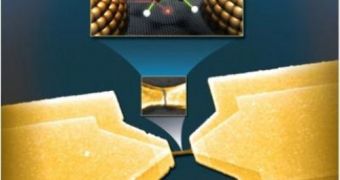Scientists from the Yale University, in the United States, and the Gwangju Institute of Science and Technology, in South Korea, have recently managed to demonstrate the first molecular transistor made out of a single molecule. The finding could have significant implications for the field of electronics research, as it could lead to the development of a large number of new devices, a lot more energy efficient and faster than existing ones. The new machine consists of a single benzene molecule attached to gold contacts, which researchers say acts just like a silicon transistor.
The team managed to control the electrical current passing through the molecule – which is essentially what a transistor does – by altering its energy state. This was achieved by altering the voltage of a current that passed through the gold contacts. “It's like rolling a ball up and over a hill, where the ball represents electrical current and the height of the hill represents the molecule's different energy states. We were able to adjust the height of the hill, allowing current to get through when it was low, and stopping the current when it was high,” the Harold Hodgkinson Professor of Engineering & Applied Science at Yale, Mark Reed, also a member of the team, explains.
The new investigation relied heavily on groundwork that Reed did back in the 1990s, when he demonstrated that single molecules could be trapped between electrical contacts. Since then, he managed to create new, innovative methods of observing the interactions that took place at the molecule level. All this preparation work eventually allowed him and former Yale postdoctoral associate Takhee Lee to create the new molecular transistor. Lee is currently a professor at the Gwangju Institute of Science and Technology (GIST).
“There were a lot of technological advances and understanding we built up over many years to make this happen,” Reed says. The group had to face a number of challenges, including creating finely separated electrical circuits at the nanoscale, figuring out the best molecule for the job, and learning how to connect the two basic components of the new transistor. “We're not about to create the next generation of integrated circuits. But after many years of work gearing up to this, we have fulfilled a decade-long quest and shown that molecules can act as transistors,” Reed concludes.

 14 DAY TRIAL //
14 DAY TRIAL //